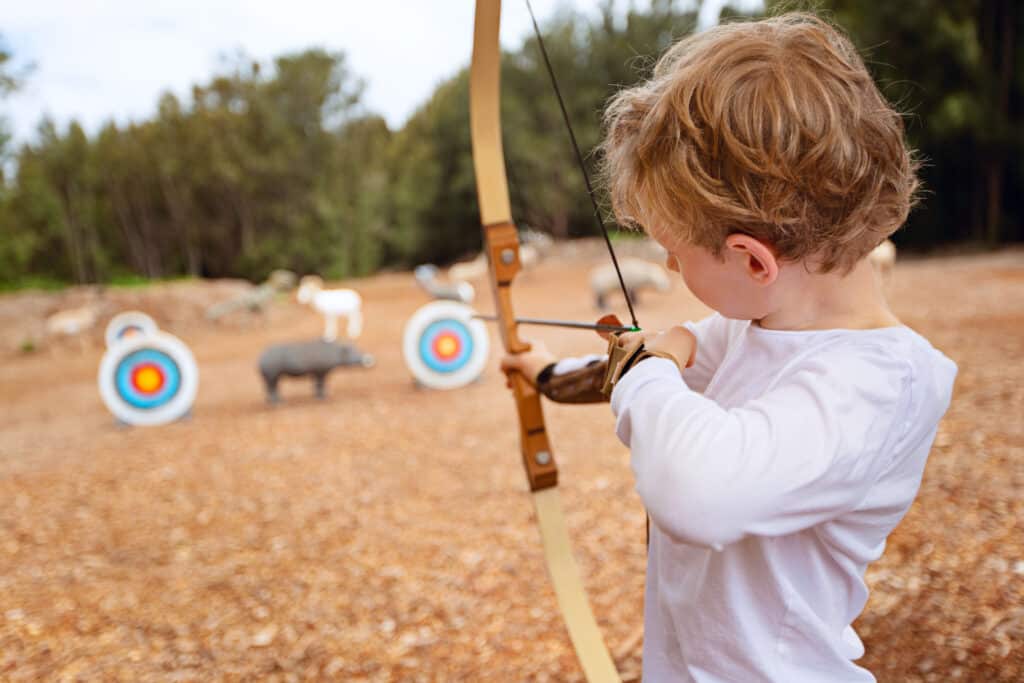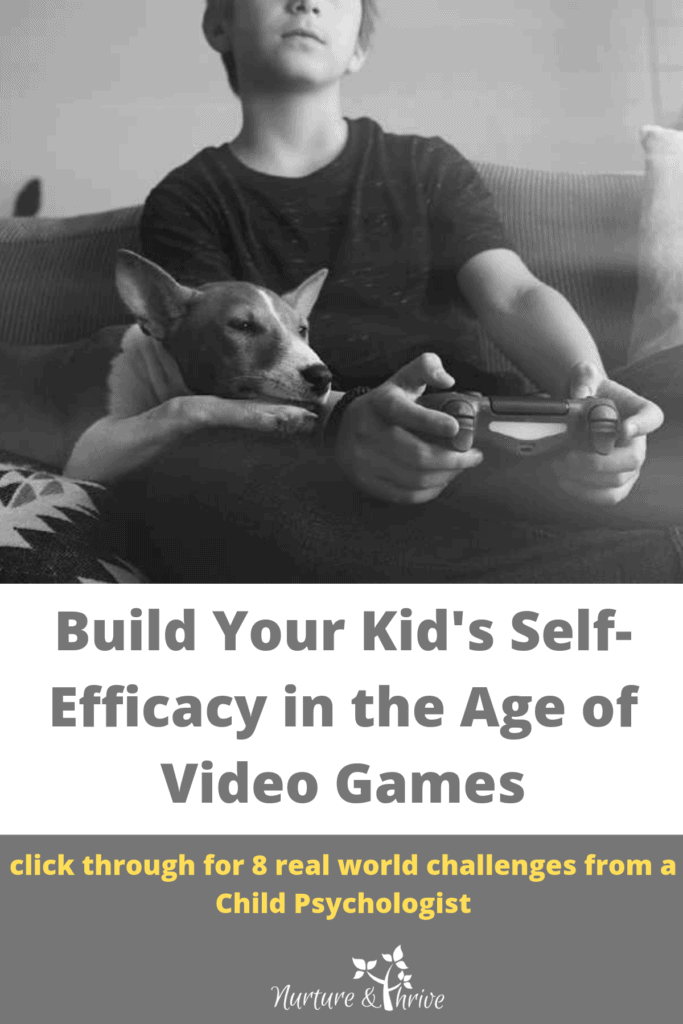Estimated reading time: 11 minutes
Inside: Video-games build a strong sense of virtual self-confidence in our kids, but does that rob them of real-life confidence and self-efficacy?
A recent study showed that the more time children spent in front of a screen (TV, smartphone, tablets, video game consoles, computers), the worse their behavior was.
Compared with children who had less than 30 minutes of screen time per day, children who spent more than two hours of screen time per day were five times more likely to exhibit behavioral problems such as inattention, acting out, hyperactivity and being oppositional; and over seven times more likely to meet the criteria for attention deficit hyperactivity disorder.

Of course, there are caveats to this study. It is correlational — meaning cause and effect is unknown. It could be that children with more behavioral problems are also more likely to spend more time in front of screens or that there is some third variable that accounts for both behavior problems and spending lots of time in front of screens.
But, if you are asking me — I see it in my own kids. Depending on what they are doing on the screen and how compelling it is, I sometimes see a shift in behavior once we turn it off and it’s not for the better.
It’s as if their minds become so tied into that virtual world, that it makes it difficult to return to the real world. Yet, the real world is where all the real interaction and learning takes place.
But here’s the catch. Video games and screens are a part of life. Wouldn’t it be better to try to teach kids to regulate screentime and balance it with all the other stuff of life.
Maybe it isn’t only about what screens are doing to our kid’s brain, but what they are missing out on spending so much time in front of the screen or thinking about games.
Remember those children showing behavior problems from too much screentime? Certain things seemed to protect against the negative effects of screentime — like getting good sleep and participating in organized sports.
Related: The Revealing Reason Why Kids Love Video Games
Why might things like organized sports have a protective effect? When you think about it, activities like sports provide children with an outlet to be challenged and feel competent at something, as well as to connect with others. These are innate needs that all kids have. All kids want to feel they are good at something; that they are improving their skills in an activity they love and that they have strong connections with others.
Throughout history, these needs for competence and skill-building were often met through challenging real-world activities and life skills they learned in the process of growing up. Decades ago, these needs might have been met through learning to build a fire or chop wood. When was the last time you let your 8-year-old use a knife in the kitchen or build a fire outside? Have we lost touch with
It seems then that our answer to the video game dilemma might be found in our own backyards, gardens, and kitchens. Can we find ways to incorporate challenging real-world experiences into our kids’ lives to help them meet these needs?
Balance The Pull of Technology with Challenge, Competence, and Connection
Kids Need Real-Life Challenges, Competency, and Connection to Build Your Kid’s Self-Efficacy
Self-efficacy is something a little different than self-esteem or self-confidence. Perhaps something a little deeper. It is the belief that you have the power to make a difference. To change a situation you don’t like, to overcome failure. Self-efficacy is the belief in one’s own agency — one’s sense of independence or autonomy.
Video-games give kids a kind of virtual self-efficacy. They can control and change many aspects of the virtual world and they can achieve multiple levels of success. That’s all fine if it’s just for fun or entertainment. But, when a child’s sense of self-efficacy is developing, the ability to distinguish virtual competency for real-world competency becomes out of balance.
But it is also important for kids to build self-efficacy in social environments — on family camping trips, on the soccer field, with fellow scouts, or even family game nights. Building social skills and social connection is one key element to balancing the
Here are some activities to help build your kid’s self-efficacy and social engagement in their world.
8 Real-World Challenges to Build Your Kid’s Self-Efficacy and Social Engagement in the Age of Video Games
Sports. There is a reason many kids are drawn to sports of all kinds—the challenge in progressively mastering a skill that is difficult. Just as video games offer increasingly difficult levels of challenge, sports provide a similar outlet for kids. They master skills in catching, throwing, kicking (or whatever the sport involves) in increasingly difficult levels. This challenge, combined with the motivating factor of competition, is very appealing to kids as it meets their need for competence and challenge.
Chess. This game is pretty amazing in that it promotes strategic thinking, patience, and progressive challenge. You may be surprised at how your kids, even as young as 5, can pick up chess and find it irresistible once they learn the rules and strategy. Since it’s been around for centuries, chess can often be an intergenerational game as well. Kids get no small amount of pleasure out of progressing enough to beat grandpa or aunts and uncles at chess! And it’s how this Dad beat his kid’s video game obsession.

Puzzles and Mazes. Although puzzles may seem “old-fashioned” by today’s standards, many kids still love them once they realize how you can progress to increasingly difficult levels. Puzzles and mazes, of course, help develop spatial skills and reasoning in a fun way. Like other classic toys, puzzles can be a team activity that builds emotional skills as well. Favorites in our house are the Perplexus Epic, Gravity Maze, and our 500 piece holiday puzzles. Real-life mazes are very engaging for kids. In the fall, find a challenging corn maze and let your kids lead or for a fun family outing try an escape room.
Brain Teasers. Many of us probably worked on brain teasers as we prepared for SATs or similar tests. Brain teasers, however, don’t have to just be busy work. Brain teasers can be 3-D puzzles, clue-solving games, spatial building challenges and more. We recently attended a “brain bender” exhibit at our local museum that involved many of these types of challenges and our kids loved it and couldn’t wait to do more.
Chores. Although kids may not always love chores, having household tasks that they oversee really does build a sense of self-efficacy. Instead of labeling them chores, perhaps you can come up with a name that sounds more engaging such as “culinary arts” or “household management.”
Research from a 75-year Harvard study showed that children who routinely did chores were more independent as adults, a factor in well-being and self-efficacy.

A few years ago, my oldest son asked to be “kitchen trained” because one of his friends was permitted to use the microwave and toaster at home. I had not really considered this at the time, but it turned out to be a huge autonomy-booster for him. He learned how to toast bread and cook bacon in the microwave. Bonus for us—he can now oversee his and his little brother’s breakfast if we want to sleep in on the weekends!
Friendships. Although kids do not have to have a lot of friends, research finds that at least one close friend can be crucial to children’s mental health as they progress into adolescence. Although some video games do allow for interaction with friends, that is not a substitute for real-life interactions. For friendships to truly be emotionally supportive and help kids build social skills, in-person interactions are key.
We can help support our children’s friendships by making our homes available to gatherings and encourage kids to meet up in real life, not just behind screens. Additionally, many parents are now limiting or completely banning smartphones when their older kids gather together to promote more face-to-face conversation.
Family Traditions and Daily Rituals.When our children are young, I think it’s easier to feel connected to them. They require a lot of hands-on care and attention, so we inherently know what’s going on in their little minds (at least some of the time).
As our children mature and start to spend more time away from us in school or activities, this connectedness can often break down a bit. I know I often get so caught up in the daily routine of school, meals, activities, etc. that I forget to just ask how my kids’ day went or if they’re struggling with anything.
These small moments are key to staying connected with our kids. Daily rituals like an afternoon snack time together or special time before bed make kids feel secure and that the details of their lives are important.
Family traditions like a spring camping trip, family game nights, or a favorite hike also help build that sense of connection. Allowing kids to have some (age-appropriate) input in choosing the family agenda is also a key way to build your kid’s self-efficacy. Maybe your older child can map out the trail for the hike or plan the menu for that family camp-out. While these might seem like mundane tasks to us, for kids it gives them a real sense of purpose in the family.
Make Outdoors Appealing Again. One aspect of the video game debate that sometimes gets overlooked is that perhaps the best solution to the challenge is literally in our own backyard.
Time outdoors can be the antidote to video game overwhelm, but we may have to foster it in clever ways.
The needs kids have for competence, challenge, and connection can all be met through outdoor play and adventure. You’ve never seen a prouder child than one who just managed to climb up a very challenging tree. Competence-building challenges like this are built into nature all around us.
My kids sometimes balk at going on “another hike” but once we are on the trail, they always enjoy it. Sometimes we have to point out and encourage them to see the nature-made challenges that are right in front of them. Encouraging kids to see what nature has to offer can really help them see the appeal of it. Pointing out trees that seem climbable, or rocks that they might be able to climb are just a few ideas of things we can do to foster outdoor adventure.
Autonomy-building activities are prevalent in nature as well. Older kids can learn how to start a fire on their own, cook foods on the fire or even learn how to safely wield a pocket knife. Even younger children can learn simple tasks to do on their own in nature like collecting sticks for the fire, learning the names of different plants and searching for unusual insects. Although these activities seem simple to us, children gain so much confidence in learning how to do them independently.

Hi I’m Amy, subscribe to my newsletter at the Thoughtful Parent and receive a free printable: Outdoor Adventure Checklist for Kids
Related: The Benefits of Being a Nature Kid (and how to get your child to enjoy nature walks!)
Video games are part of our children’s world today. As parents, it’s probably unwise and impractical to shield them from all of them. Balance is key to our approach in handling video games. We can learn to see the value that some video games provide in offering a novel outlet for them to feel competent and be challenged. Some studies suggest that real benefits like better peer relationships can be fostered by the playful competition that video games provide.
However, we can also help our kids learn that real-world experiences and nature provide fascinating challenges and adventures well beyond those of the games. If we can help our kids see how real-world challenges offer them the same feelings of competence and autonomy, we will have given them a lifelong gift.
Related: Teach Your Kids To Manage Their Own Screen Time



 Picture Books That Teach Kids How to Stop and Think, Handle Emotions, and Be Mindful
Picture Books That Teach Kids How to Stop and Think, Handle Emotions, and Be Mindful